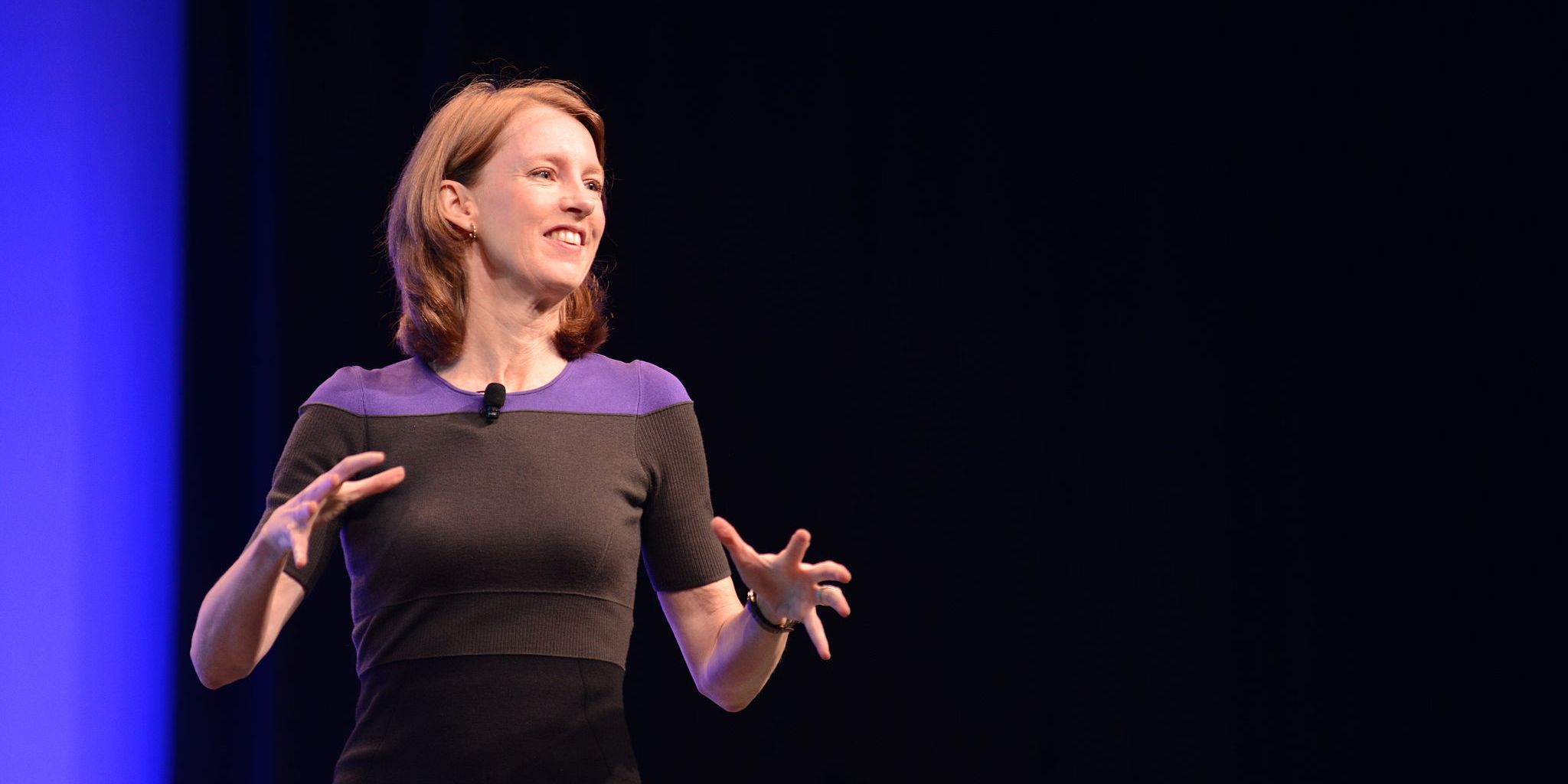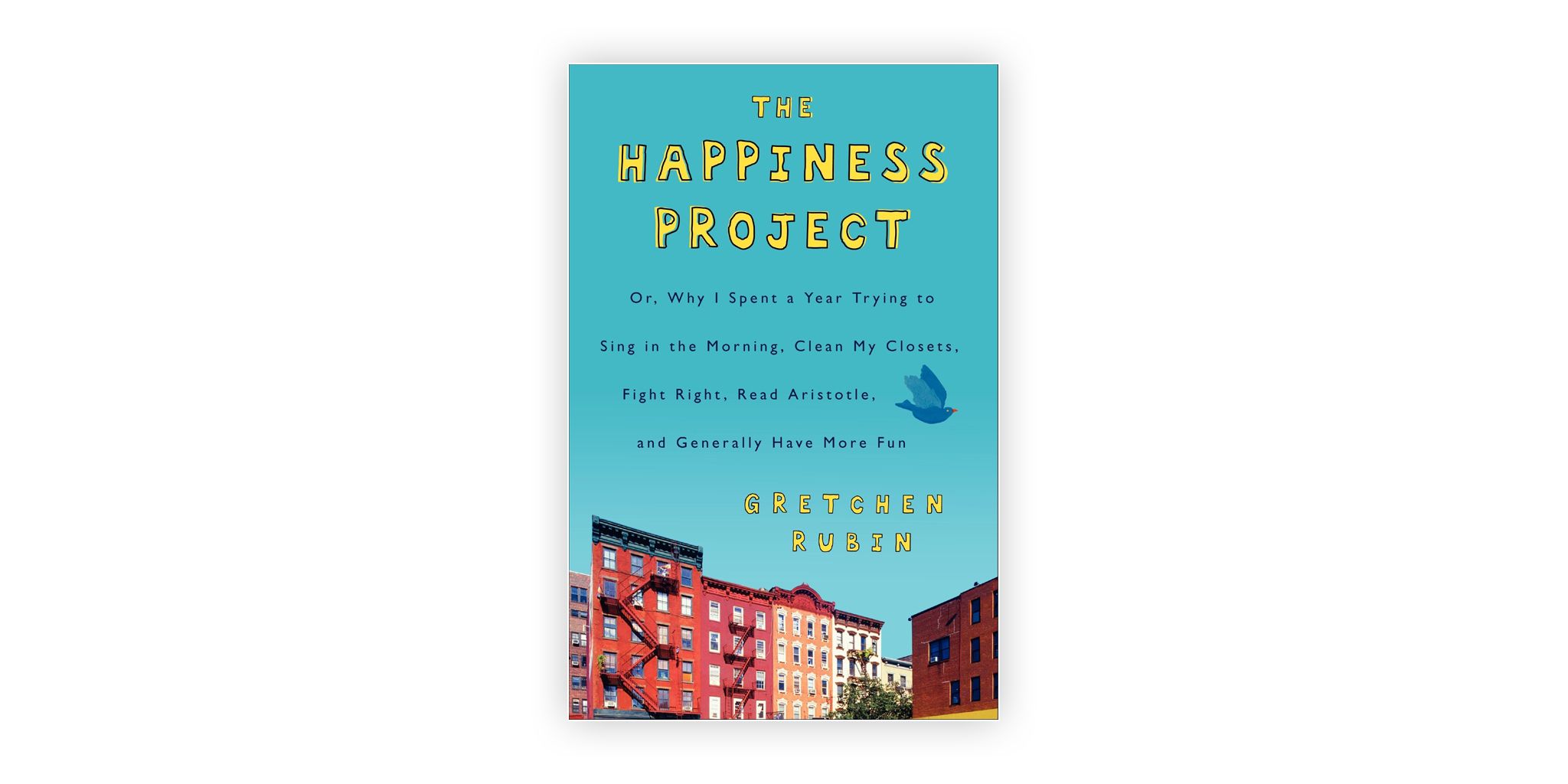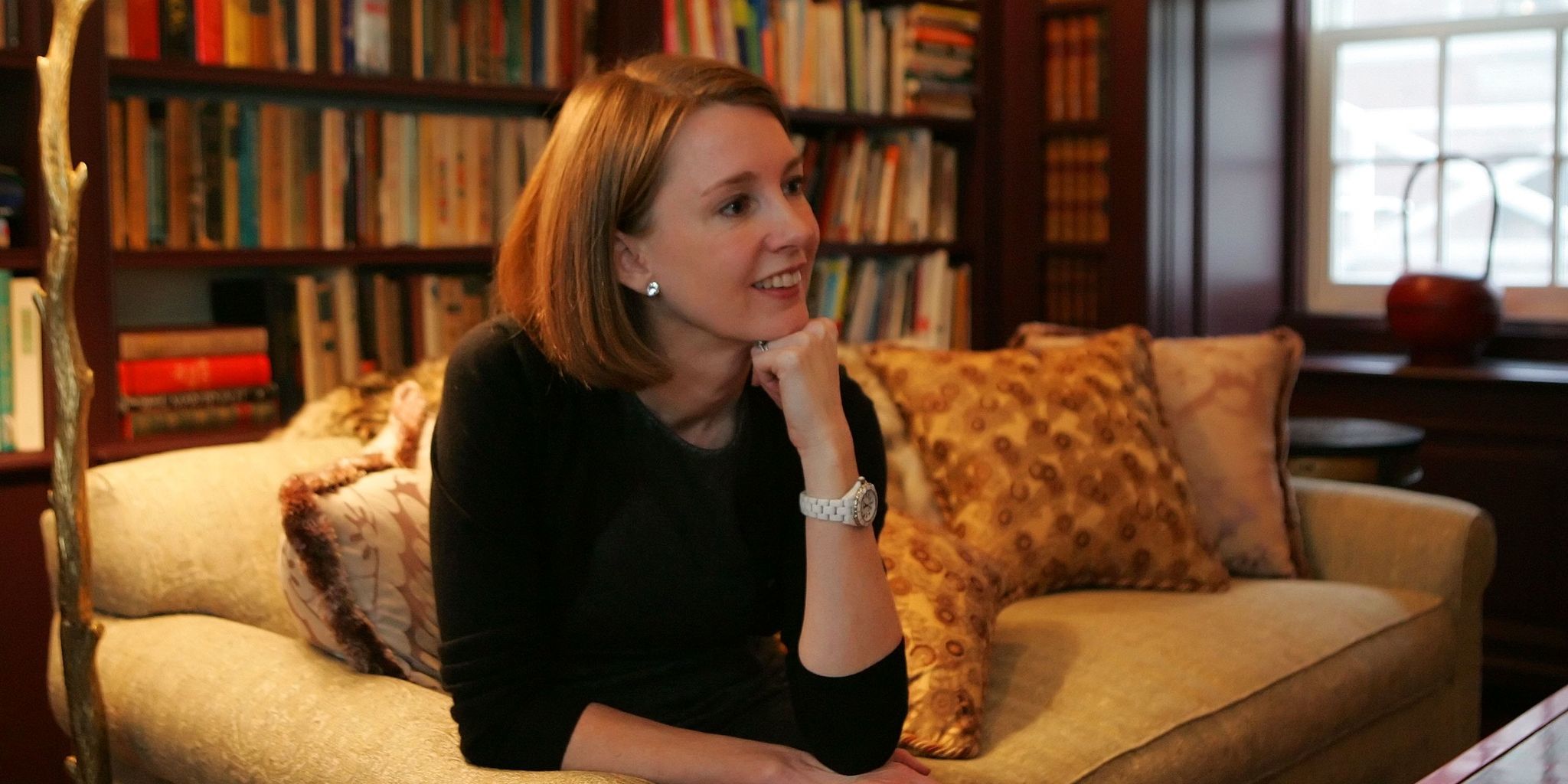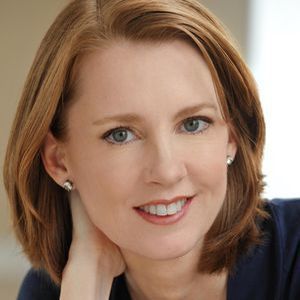Interview with Gretchen Rubin
Michael Sliwinski: Before we dive into happiness and your “Happiness Project”, let’s just start with your career. You finished law school at Yale and that is quite a big deal, then after becoming a successful lawyer, you decided one day to quit…What happened?
Gretchen Rubin: Well, I had a great time as a lawyer. I was working for one of the best law firms around, but I finally realized something that has been in the back of my mind for a long time, which is that I really wanted to be a writer. And it was at that point that I really came to feeling like, I’d rather fail as a writer then succeed as a lawyer, and I really need to give it a shot and try to make it work for a bit or fail. That was about 12 years ago now, that I made the switch. And my husband and I were moving from Washington DC to New York and so part of the transition was both of us stopping our careers as lawyers.
Michael: So you made the switch to a career you actually wanted to do and you have a husband that you love and you have great kids and so you were basically happy… so, why “The Happiness Project”?
Gretchen: Well, I was pretty happy when I started “The Happiness Project". So, I wasn’t coming from a place of depression or misery. I had all the omens of a happy life. But I asked myself one day as I was stuck in a city bus in the pouring rain “what do I want from life?” I wanted to be happy, but I never spent time thinking about being happy or how I could be happier. And so I decided to start a happiness project. And one of the things I really wanted to do, as my happiness project, was really to appreciate my life more. To stop taking it for granted and being distracted by the little things that were going wrong and losing sight of how much I really had. And I wanted to live up to it better, expect more of myself and to really appreciate what I had. So yes, I was pretty happy when I started, but one of the things I really wanted to do was not to take my life for granted as much as I had.
Michael: Yes, I think it is the same for me as well. So many things are going great in my life which I just take for granted. I just think ‘it is like this’. And then I start being annoyed about small things that actually don’t even matter, right?
Gretchen: Right. There is something called negativity bias, which is that people are just psychologically biased to pay more attention to things that are going wrong, that are scary, that are annoying and so you really have to make an effort to train your sight towards the things that are good. Because if you leave them like this… you are naturally just going to drift downward. And it is easy. It is very easy to let one little thing go wrong and it just fills up your mind and you forget about all the million things that you should be happy about.
Michael: So, you embarked on this one year "trip” and you’ve made a resolution to just be happier. From what you have learned, what are the smallest things that you can do or implement just now to feel happier?
Gretchen: Well, this is surprising, but the number one thing that people mention, that they think that they’ve tried and has made them happier is the resolution to make your bed. It’s such a little thing, but this seems to be something that people really get a boost from. It’s very small, very manageable; it’s first thing in the morning so that’s one thing. Another thing that you can do is just sit down a few times. That takes no time and there is just something so goofy, and silly and energetic about doing a few jumping jacks, running a few stairs or just jumping up and down by your desk that really gives you this kind of boost of childlike energy. It’s really fun, so those are two things that are small but effective.
Michael: In my case, for example, it is to have a clean desk when I start working. I just feel better when I have a clean desk. The Zen feeling is just kind of happier to me.
Gretchen: One of the things that I’ve noticed, one of my secrets of adulthood is that for most people outer order contributes to inner calm more than you would think. And it seems like… well, what’s really the difference between clean desk and messy desk? In the end it is pretty much the same. And over and over people say that having a clean desk, having clothes closet that’s not full of clothes, you are having your kitchen cabinet door closed easily. These things matter almost more then they should. They don’t seem that significant really, to a happy life and yet over and over again people say that it really does make a difference. So, I do spend a lot more time just managing the exterior of my environment, because I find that it really does help. Like you, I’m exactly the same way, it really does make me feel more calm, more focused, more patient… it’s worth the effort.
Michael: I’ve read in your book that you mention that you like to clean things. Clean up desks and drawers so much that you insist on going to people houses and clean up their stuff without actually asking them.
Gretchen: Yeah. It’s actually more fun to clean up other people’s clutter, because it’s just easier, you know? With your own clutter you have all those ideas about it, but when it is somebody else’s clutter you are just like “get rid of that”, “that should be recycled”, etc. It’s much easier. So it’s all the fun with none of the emotional drain that comes from your own stuff.

Photo: Gretchen Rubin at Texas Conference for Women / Dell’s Official Flickr Page, CC BY 2.0
Michael: You must be a scary person then :-) So, about the New Year’s resolutions, tell me is there any trick to actually stick to the New Year’s resolutions?
Gretchen: Yes. I mean it is fun to make your New Year’s resolutions, but something like 80% of New Year’s resolutions are abandoned by mid February. So, people aren’t very good at sticking to New Year’s resolutions. So, for me, I think what I found are two really cute things. One is to be very, very concrete and specific with the resolution. So, for example, resolutions people say to me all the time are like these: “I want to have more fun with my family” or “I want to appreciate the moment more”. Those are good aims and they would make you happier, but they’re vague, because it’s Monday and you are about to go through a day, what are you going to do to appreciate the moment more? What are you doing to do to have more fun with your family?
I think it is much more effective, when you are very specific. Say like “we are going to watch a family movie every Sunday night together” or “I’m going to take 10 minutes to sit in my back garden and enjoy playing with my dog everyday”. Be very specific so that you know what you are expecting of yourself. And you know whether you’re done or not. Which leads to the second thing, accountability. It is really important to have some sense of holding yourself to your resolution, because we all have those good intentions. But day after day goes by and you just don’t get around to doing it.
That’s why I have a chart and I literally write down every resolution and I check off whether I did it or not. Other people do it online. I have this happiness toolbox. Some people form happiness project groups, some people just go back and forth to a sibling or a friend, some people start that on blogs. There are all kinds of things you can do. You just have to find the thing that works for you, but it is very important to have this sense of accountability, because without that it’s just easy to not follow through.
Here is something that separates me from most, even for something that I like to do, like read, I love to read, and I would think: “oh, I love to read so of course I don’t need a resolution to read more” but actually I do and it is kind of hard for me to stick to that resolution. So just because something is enjoyable doesn’t mean that you are necessarily going to find it easy to stick to. That’s why I think accountability measures really help.
Michael: I my case, I had resolution to read more, but I struggle to find time for that. I always have so much on my plate that I never have time to read. And after doing this resolution the whole year I’ve read 3 books. So, not really helpful. And then I realized there is a different way of reading. So I just chose audiobooks and the next year I read 30 books. And that’s a totally different thing. I have audiobooks with me all the time on my iPhone and it always comes as a surprise to me how many times I have the opportunity to read when I’m just walking, driving or running errands.
Gretchen: See. That’s a great way of thinking about what could work for you, to get you to the same place but through a different way. So that’s great.
Michael: Yes, I’m really happy about the outcome :-) Now, let’s talk more about productivity. What do you think? If we are more productive, are we happier? Or if we are happier, are we more productive?
Gretchen: I think both things are true. Because I think that when you are happier you are far more energetic and more creative and it is also easier to get yourself to do things that you do not want to do. Because sometimes being productive is being stuck with chores and jobs that you’d rather not do. So, you are more able to take those on. But then I think people do get a real sense of satisfaction from getting something done. And sometimes you can engineer a little mood-boost for yourself by just saying “you know what, I just feel lazy, I’m going to do something that I’ve been putting off and just get it done and get it off my mind, get it off my list" and that can give you that sense of good cheer and energy. So I think you can use it both ways. They feed onto each other, because they are tied together.
Michael: In your book you mention that you finally have forced yourself to do those things you have been putting off for so much time. On the other hand we also have to be able to say “no” to things that we shouldn’t be doing anyway.
Gretchen: I think that’s the key thing. It’s not that you should do everything, but that you should figure out what is important to you. Because the one thing that I really can understand from my Happiness Project is that I can only have a happy life on a foundation of my own interests, my own temperament, my own values. But when your day is full of things that you are not interested in, or that you don’t really value you are not going to feel so happy. So a lot of that is really figuring out what are the kinds of things that I should be doing with my time. Not just trying to do everything to make sure that you are doing the right things for yourself. Everybody’s different. So there is no one-size-fits-all answer. You will have to figure this out for yourself.
Michael: Tell me more about your writing. You have 4 unpublished novels, what about them?
Gretchen: You know I’m really not a novelist. That’s really a different kind of skill. So I wrote them because it is fun and…. one of the things that writers often experience is that you don’t really have that much control over what you feel like writing. You can control what you write, but you don’t control what you feel like writing. So, these were good exercises for me, because they were things that I felt like doing. And I think for any kind of writer any kind of writing is like doing scale for a musician. It’s just helpful to be writing. But I’m really a non-fiction writer, doing biographies and other sort of social criticism, that’s what I do professionally. I often do enjoy these side projects, but they are not publishable quality.
Michael: So, do you have any plans for a new book? Anything you can tell us about?
Gretchen: Yes, actually I have a book that will be coming out in August of 2012 and it is called “Happier At Home”. Samuel Johnson, who is one of my patron saints of my Happiness Project, wrote: “the ultimate result of all ambition is to be happy at home”. And I was thinking about this and I realized that really, my first happiness project was very broad and I wanted to go deeper into it, and it seemed to me that a great focus for it would be home. Because home encompasses so many things and there are so many things we want from our home. It’s relationships, it’s stuff, it’s time, it’s neighborhood, it’s all these things and so I thought “OK, I’m going to do a happiness project again, because I loved doing my first one, but this time I’m really going to focus on home and make that the lens through which I will look at everything”. It’s so fascinating to think about that and to think about what I would do, what kind of resolutions I would set and what kind of aims I would have if I really wanted to feel more “at home” at home. So it’s really so much fun.
If you want to learn more of Gretchen’s tips for a happier life, check out one of her books: The Happiness Project: Or, Why I Spent a Year Trying to Sing in the Morning, Clean My Closets, Fight Right, Read Aristotle, and Generally Have More Fun.


